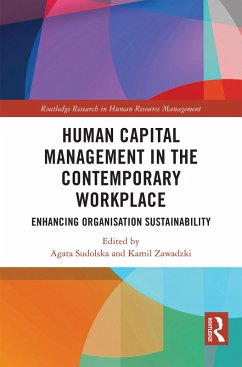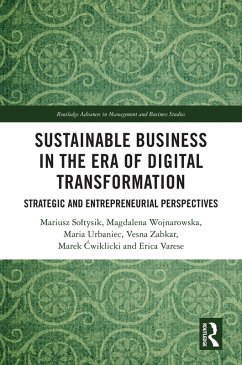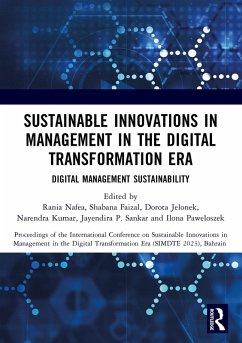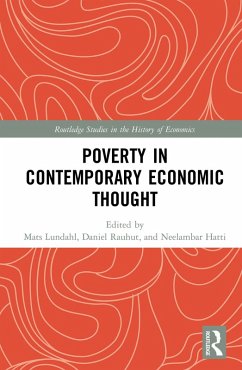
New Paradigms of Sustainability in the Contemporary Era (eBook, ePUB)

PAYBACK Punkte
15 °P sammeln!
As our world grapples with the profound challenges of the 21st century, the concept of sustainability has emerged as a guiding light, illuminating the path towards a more equitable, resilient, and harmonious future. This edited volume, "New Paradigms of Sustainability in the Contemporary Era," presents a collection of diverse voices and groundbreaking perspectives that collectively redefine how we perceive and approach sustainability in our rapidly evolving world.The contemporary era has witnessed a seismic shift in our understanding of sustainability. Traditionally, the focus was on environme...
As our world grapples with the profound challenges of the 21st century, the concept of sustainability has emerged as a guiding light, illuminating the path towards a more equitable, resilient, and harmonious future. This edited volume, "New Paradigms of Sustainability in the Contemporary Era," presents a collection of diverse voices and groundbreaking perspectives that collectively redefine how we perceive and approach sustainability in our rapidly evolving world.
The contemporary era has witnessed a seismic shift in our understanding of sustainability. Traditionally, the focus was on environmental conservation, resource management, and mitigating the impacts of human activities on the planet. While these aspects remain critical, they are now seen as interconnected with broader issues of social justice, economic viability, and cultural preservation.
In this volume, we explore the multifaceted dimensions of sustainability, encompassing not only environmental stewardship but also social inclusivity, economic resilience, and cultural preservation. We delve into innovative paradigms that acknowledge the intricate interplay of these elements, offering fresh perspectives and trans-formative solutions. One of the central themes in this volume is the redefinition of sustainability as a holistic concept. Contributors to this volume challenge conventional silos, encouraging us to view sustainability through a more comprehensive and integrative lens.
From regenerative agriculture practices that restore soil health and enhance food security to inclusive urban planning that prioritizes equitable access to resources, each chapter in this volume contributes to a richer understanding of sustainability. The chapters transcend disciplinary boundaries, fostering cross-pollination of ideas and approaches that have the potential to catalyze transformative change.
Another prominent theme explored in this volume is the power of local action in shaping global sustainability outcomes. While international agreements and policies play a critical role, the volume underscores the importance of grassroots initiatives, community engagement, and localized solutions. These approaches not only empower individuals and communities but also have a ripple effect, influencing regional and global sustainability agendas.
This volume is not limited to theoretical discussions. It is enriched with inspirational case studies and practical examples from around the world. From indigenous communities practicing traditional knowledge-based conservation to tech-driven innovations that address urban sustainability challenges, these real-world examples demonstrate the feasibility and effectiveness of new sustainability paradigms.
"New Paradigms of Sustainability in the Contemporary Era" represents a collective endeavour to expand the horizons of sustainability thinking. It invites readers to explore the evolving landscape of sustainability, embracing inter-connectedness, innovation, and inclusivity as essential components of our journey towards a more sustainable future. In a world facing climate change, social inequalities, economic uncertainties, and cultural transformations, this volume offers hope and direction. It highlights that sustainability is not a static destination but an ongoing journey, one that requires us to adapt, collaborate, and imagine new possibilities.
As we navigate the challenges and opportunities of the contemporary era, let this edited volume serve as a source of inspiration and a catalyst for action. Together, we can embrace new paradigms of sustainability, redefining our relationship with the planet, each other, and the future generations who will inherit the world we shape today.
The contemporary era has witnessed a seismic shift in our understanding of sustainability. Traditionally, the focus was on environmental conservation, resource management, and mitigating the impacts of human activities on the planet. While these aspects remain critical, they are now seen as interconnected with broader issues of social justice, economic viability, and cultural preservation.
In this volume, we explore the multifaceted dimensions of sustainability, encompassing not only environmental stewardship but also social inclusivity, economic resilience, and cultural preservation. We delve into innovative paradigms that acknowledge the intricate interplay of these elements, offering fresh perspectives and trans-formative solutions. One of the central themes in this volume is the redefinition of sustainability as a holistic concept. Contributors to this volume challenge conventional silos, encouraging us to view sustainability through a more comprehensive and integrative lens.
From regenerative agriculture practices that restore soil health and enhance food security to inclusive urban planning that prioritizes equitable access to resources, each chapter in this volume contributes to a richer understanding of sustainability. The chapters transcend disciplinary boundaries, fostering cross-pollination of ideas and approaches that have the potential to catalyze transformative change.
Another prominent theme explored in this volume is the power of local action in shaping global sustainability outcomes. While international agreements and policies play a critical role, the volume underscores the importance of grassroots initiatives, community engagement, and localized solutions. These approaches not only empower individuals and communities but also have a ripple effect, influencing regional and global sustainability agendas.
This volume is not limited to theoretical discussions. It is enriched with inspirational case studies and practical examples from around the world. From indigenous communities practicing traditional knowledge-based conservation to tech-driven innovations that address urban sustainability challenges, these real-world examples demonstrate the feasibility and effectiveness of new sustainability paradigms.
"New Paradigms of Sustainability in the Contemporary Era" represents a collective endeavour to expand the horizons of sustainability thinking. It invites readers to explore the evolving landscape of sustainability, embracing inter-connectedness, innovation, and inclusivity as essential components of our journey towards a more sustainable future. In a world facing climate change, social inequalities, economic uncertainties, and cultural transformations, this volume offers hope and direction. It highlights that sustainability is not a static destination but an ongoing journey, one that requires us to adapt, collaborate, and imagine new possibilities.
As we navigate the challenges and opportunities of the contemporary era, let this edited volume serve as a source of inspiration and a catalyst for action. Together, we can embrace new paradigms of sustainability, redefining our relationship with the planet, each other, and the future generations who will inherit the world we shape today.
Dieser Download kann aus rechtlichen Gründen nur mit Rechnungsadresse in A, D ausgeliefert werden.













